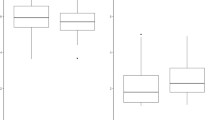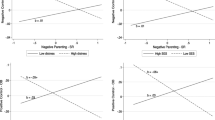Abstract
The current study examined the congruence of parent and adolescent reports of positive and negative parenting with observations of parent-adolescent interactions as the criterion measure. The role of parent and adolescent depressive symptoms in moderating the associations between adolescent or parent report and observations of parenting also was examined. Participants were 180 parents (88.9 % female) with a history of clinical depression and one of their 9-to-15 year old children (49.4 % female). Parents and adolescents reported on parenting skills and depressive symptoms, and parenting was independently observed subsequently in the same session. Findings indicated adolescent report of positive, but not negative, parenting was more congruent with observations than parent report. For negative parenting, depressive symptoms qualified the relation between the parent or adolescent report and independent observations. For parents, higher levels of depressive symptoms were associated with more congruence with observed parenting (supporting a depressive realism hypothesis) whereas an opposite trend emerged for adolescents (providing some supporting evidence for a depression-distortion hypothesis).


Similar content being viewed by others
References
Achenbach, T. M. (2011). Commentary: definitely more than measurement error: but how should we understand and deal with informant discrepancies? Journal of Clinical Child and Adolescent Psychology, 40, 80–86. doi:10.1080/15374416.2011.533416.
Alderfer, M. A., Fiese, B. H., Gold, J. I., Cutuli, J. J., Holmbeck, G. N., Goldbeck, L., et al. (2008). Evidence-based assessment in pediatric psychology: family measures. Journal of Pediatric Psychology, 33, 1046–1061. doi:10.1093/jpepsy/jsm083.
Alloy, L. B., & Abramson, L. Y. (1979). Judgment of contingency in depressed and non-depressed students: sadder but wiser? Journal of Experimental Psychology. General, 108, 441–485. doi:10.1037//0096-3445.108.4.441.
Barry, C. T., Frick, P. J., & Grafeman, S. J. (2008). Child versus parent reports of parenting practices: implications for the conceptualization of child behavioral and emotional problems. Assessment, 15, 294–303. doi:10.1177/1073191107312212.
Beck, A. T., Steer, R. A., & Brown, G. K. (1996). Manual for the beck depression inventory-II. San Antonio: Psychological Corporation.
Chi, T. C., & Hinshaw, S. P. (2002). Mother-child relationships of children with ADHD: the role of maternal depressive symptoms and depression-related distortions. Journal of Abnormal Child Psychology, 30, 387–400. doi:10.1023/A:1015770025043.
Cohen, J., & Cohen, P. (1983). Applied multiple regression/correlation analysis for the behavioral sciences (2nd ed.). Hillsdale: Erlbaum.
Compas, B. E., Forehand, R., Keller, G., Champion, A., Rakow, A., Reeslund, K. L., et al. (2009). Randomized clinical trial of a family cognitive-behavioral preventive intervention for children of depressed parents. Journal of Consulting and Clinical Psychology, 77, 1007–1020. doi:10.1037/a0016930.
Compas, B. E., Champion, J. E., Forehand, R., Cole, D. A., Reeslund, K. L., Fear, J., et al. (2010). Coping and parenting: mediators of 12-month outcomes of a family group cognitive–behavioral preventive intervention with families of depressed parents. Journal of Consulting and Clinical Psychology, 78(5), 623–634. doi:10.1037/a0020459.
Compas, B. E., Forehand, R., Champion, J. E., Keller, G., Hardcastle, E. J., Cole, D. A., et al. (2011a). Family group cognitive-behavioral preventive intervention for families of depressed parents: 18- and 24-month outcomes. Journal of Consulting and Clinical Psychology, 79, 488–499. doi:10.1037/a0024254.
Compas, B. E., Keller, G., & Forehand, R. (2011b). Prevention of depression in families of depressed parents. In T. Strauman, P. R. Costanzo, & J. Garber (Eds.), Prevention of depression in adolescent girls: A multidisciplinary approach (pp. 318–339). New York: Guilford.
De Los Reyes, A., Goodman, K. L., Kliewer, W., & Reid-Quiñones, K. (2008). Whose depression relates to discrepancies? Testing relations between informant characteristics and informant discrepancies from both informants’ perspectives. Psychological Assessment, 20, 139–149. doi:10.1037/1040-3590.20.2.139.
England, M. M., & Sim, L. J. (Eds.). (2009). Depression in parents, parenting, and children: Opportunities to improve identification, treatment, and prevention. Washington, DC: The National Academies Press.
Fendrich, M., Weissman, M. M., Warner, V., & Mufson, L. (1990). Two-year recall of lifetime diagnoses in offspring at high and low risk for major depression: the stability of offspring reports. Archives of General Psychiatry, 47, 1121–1127.
First, M. B., Spitzer, R. L., Gibbon, M., & Williams, J. B. W. (2001). Structured clinical interview for DSM–IV–TR axis I disorders, research version, patient edition (SCID-I/P). New York: Biometrics Research, New York State Psychiatric Institute.
Forehand, R., Thigpen, J. C., Parent, J., Hardcastle, E. J., Bettis, A., & Compas, B. E. (2012). The role of parent depressive symptoms in positive and negative parenting in a preventive intervention. Journal of Family Psychology, 26, 532–541. doi:10.1037/a0028406.
Frick, P. J. (1991). The Alabama Parenting Questionnaire. Unpublished rating scale. Tuscaloosa: University of Alabama.
Gartstein, M. A., Bridgett, D. J., Dishion, T. J., & Kaufman, N. K. (2009). Depressed mood and maternal report of child behavior problems: another look at the depression-distortion hypothesis. Journal of Applied Developmental Psychology, 30, 149–160. doi:10.1016/j.appdev.2008.12.001.
Gerdes, A. C., Hoza, B., Arnold, L. E., Pelham, W. E., Swanson, J. M., Wigal, T., et al. (2007). Maternal depressive symptomatology and parenting behavior: exploration of possible mediators. Journal of Abnormal Child Psychology, 35, 705–714. doi:10.1007/s10802-007-9134-3.
Goodman, S. H., & Gotlib, H. (1999). Risk for psychopathology in children of depressed mothers: a developmental model for understanding mechanisms of transmission. Psychological Review, 106, 458–490. doi:10.1037/0033-295X.106.3.458.
Goodman, S. H., & Tully, E. (2006). Depression in women who are mothers. In C. L. M. Keyes & S. H. Goodman (Eds.), Women and depression: A handbook for the social, behavioral, and biomedical sciences (pp. 241–280). Cambridge: Cambridge University Press.
Goodman, S. H., Rouse, M. H., Connell, A. M., Broth, M. R., Hall, C. M., & Heyward, D. (2011). Maternal depression and child psychopathology: a meta-analytic review. Clinical Child and Family Psychology Review, 14, 1–27. doi:10.1007/s10567-010-0080-1.
Hinshaw, S. P., Owens, E. B., Wells, K. C., Kraemer, H. C., Abikoff, H. B., Arnold, L. E., et al. (2000). Family processes and treatment outcome in the MTA: negative/ineffective parenting practices in relation to multimodal treatment. Journal of Abnormal Child Psychology, 28, 555–568. doi:10.1023/A:1005183115230.
Kaufman, J., Birmaher, B., Brent, D., Rao, U., Flynn, C., Moreci, P., et al. (1997). Schedule for affective disorders and schizophrenia for school-age children—present and lifetime version (K-SADS-PL): initial reliability and validity data. Journal of the American Academy of Child and Adolescent Psychiatry, 36, 980–988. doi:10.1097/00004583-199707000-00021.
Kazdin, A. E. (2003). Research design in clinical psychology. Boston: Allyn & Bacon.
Leung, D. W., & Slep, A. M. S. (2006). Predicting inept discipline: the role of parental depressive symptoms, anger, and attributions. Journal of Consulting and Clinical Psychology, 74, 524–534. doi:10.1037/0022-006X.74.3.524.
Lim, J., Wood, B. L., & Miller, B. D. (2008). Maternal depression and parenting in relation to child internalizing symptoms and asthma disease activity. Journal of Family Psychology, 22, 264–273. doi:10.1037/0893-3200.22.2.264.
Lovejoy, M. C. (1991). Maternal depression: effects on social cognition and behavior in parent–child interactions. Journal of Abnormal Child Psychology, 19, 693–706. doi:10.1007/BF00918907.
Lovejoy, M. C., Graczyk, P. A., O’Hare, E., & Neuman, C. (2000). Maternal depression and parenting behavior: a meta-analytic review. Clinical Psychology Review, 20, 561–592. doi:10.1016/S0272-7358(98)00100-7.
McKee, L. G., Jones, D. J., Forehand, R., & Cueller, J. (2013). Assessment of parenting style, parenting relationships, and other parenting variables. In D. Saklofski (Ed.), Handbook of psychological assessment of children and adolescents (pp. 788–821). New York: Oxford University Press.
Melby, J. N., & Conger, R. D. (2001). The Iowa family interaction rating scales: Instrument summary. In P. K. Kerig & K. M. Lindahl (Eds.), Family observational coding systems (pp. 33–58). Mahwah: Erlbaum.
Melby, J. N., Conger, R. D., Book, R., Rueter, M., Lucy, L., Repinski, L., et al. (1998). The Iowa Family Interaction Rating Scales (5th ed.). Unpublished manuscript. Ames, Iowa: Institute for Social and Behavioral Research, Iowa State University.
Montemayor, R. (1986). Family variation in adolescent storm and stress. Journal of Adolescent Research, 5, 15–31. doi:10.1177/074355488611003.
Moore, M. T., & Fresco, D. M. (2012). Depressive realism: a meta-analytic review. Clinical Psychology Review, 32, 496–509. doi:10.1016/j.cpr.2012.05.004.
Morsbach, S. K., & Prinz, R. J. (2006). Understanding and improving the validity of self-report of parenting. Clinical Child and Family Psychology Review, 9, 1–21. doi:10.1007/s10567-006-0001-5.
Patterson, G. R. (1982). Coercive family process. Eugene: Castalia.
Querido, J. G., Eyberg, S. M., & Boggs, S. R. (2001). Revisiting the accuracy hypothesis in families of young children with conduct problems. Journal of Clinical Child and Adolescent Psychology, 30, 253–261. doi:10.1207/S15374424JCCP3002_12.
Radloff, L. S. (1977). The CES-D scale: a self-report depression scale for research in the general population. Applied Psychological Measurement, 1, 385–401. doi:10.1177/014662167700100306.
Rapee, R. M. (1997). Potential role of childrearing practices in the development of anxiety and depression. Clinical Psychology Review, 17(1), 47–67. doi:10.1016/S0272-7358(96)00040-2.
Richters, J. E. (1992). Depressed mothers as informants about their children: A critical review of the evidence for distortion. Psychological Bulletin, 112, 485–499. doi:10.1037/0033-2909.112.3.485.
Roberts, R. E., Lewinsohn, P. M., & Seeley, J. R. (1991). Screening for adolescent depression: A comparison of depression scales. Journal of the American Academy of Child and Adolescent Psychiatry, 30, 58–66.
Salihovic, S., Kerr, M., Ozdemir, M., & Pakalniskiene, V. (2012). Directions of effects between adolescent psychopathic traits and parental behavior. Journal of Abnormal Child Psychology, 40, 957–969. doi:10.1007/s10802-012-9623-x.
Scott, S., Briskman, J., & Dadds, M. R. (2011). Measuring parenting in community and public health research using brief child and parent reports. Journal of Child and Family Studies, 20, 343–352. doi:10.1007/s10826-010-9398-z.
Sessa, F. M., Avenevoli, S., Steinberg, L., & Morris, A. S. (2001). Correspondence among informants on parenting: preschool children, mothers, and observers. Journal of Family Psychology, 15, 53–68. doi:10.1037/0893-3200.15.1.53.
Shelton, K. K., Frick, P. J., & Wooton, J. (1996). Assessment of parenting practices in families of elementary school-ages children. Journal of Clinical Child and Adolescent Psychology, 37, 105–130. doi:10.1207/s15374424jccp2503_8.
Taber, S. M. (2010). The veridicality of children’s reports of parenting: a review of factors contributing to parent–child discrepancies. Clinical Psychology Review, 30, 999–1010. doi:10.1016/j.cpr.2010.06.014.
Weissman, M. M., Orvaschel, H., & Padian, N. (1980). Children’s symptom and social functioning self-report scales: comparison of mothers’ and children’s reports. Journal of Nervous Mental Disorders, 168, 736–740. doi:10.1097/00005053-198012000-00005.
Youngstrom, E., Izard, C., & Ackerman, B. (1999). Dysphoria-related bias in maternal ratings of children. Journal of Consulting and Clinical Psychology, 67, 905–909. doi:10.1037/0022-006X.67.6.905.
Acknowledgments
This research was supported by grants R01MH069940 and R01 MH069928 from the National Institute of Mental Health, a NICHD Research Supplement to Promote Diversity in Health-Related Research (R01HD064723-02S1), and gifts from the Ansbacher family and from Patricia and Rodes Hart.
Author information
Authors and Affiliations
Corresponding author
Rights and permissions
About this article
Cite this article
Parent, J., Forehand, R., Dunbar, J.P. et al. Parent and Adolescent Reports of Parenting When a Parent Has a History of Depression: Associations with Observations of Parenting. J Abnorm Child Psychol 42, 173–183 (2014). https://doi.org/10.1007/s10802-013-9777-1
Published:
Issue Date:
DOI: https://doi.org/10.1007/s10802-013-9777-1




